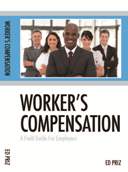|
Understanding Your Experience Modification
Factor
More Important Than Ever
Once upon a time, the experience modification factor was
largely a technical insurance issue, familiar to
employers who purchase Workers Compensation insurance
but often poorly understood.
Today, many employers are
learning that the EMR
(also known as an Experience Modification Rating, Experience
Modification Factor,
X-Mod, Experience Modifier, or just the Mod) can be
critical to the viability of their company.
Sure, the experience modifier directly impacts
the cost of Workers Compensation insurance for
employers.
But a secondary impact of experience rating
has arisen in recent years. Nowadays, many potential
customers use the experience mod as a measure
of how safely a company operates--and will shut
out companies from bidding on work if their
modifier is higher than a 1.00 or 1.05.
Experience modifiers are calculated by Workers
Compensation rating bureaus like NCCI (or WCIRB
in California, and a few other independent bureaus in a
handful of other states).
And in just the past couple of
years,
NCCI has dramatically altered the formula used to
calculate experience modifiers.
So many companies are
finding their mods spiking higher, just as their
customers are increasingly focusing on them.
We've
been able to help a number of them, getting mods lowered
by spotting and correcting errors in the underlying data
used to calculate experience mods.
Experience Modifiers are calculated using losses and
audited payrolls reported for past years by a company's
past WC insurers. But because quality control is
poor in the process, errors are often not
caught and corrected. It is a classic Garbage
In, Garbage Out situation.
We Review Experience Modification Factor
Calculations and Get Mods Lowered For Clients by
Correcting Errors
The experience modification factor is an
adjustment that is made to the Workers' Compensation
insurance premium of companies that meet or exceed a
certain minimal size threshold.
This threshold is measured in
manual premium and varies from state to state. But
typically, a company that has been paying $5,000 in
manual premium for the past few years or has paid
$10,000 or more in a single recent year qualifies to be
experience rated.
This means that an experience mod adjustment factor will be calculated
for such a company based on prior years' payroll and
loss data, essentially comparing the loss data of that
particular company to average loss data for all other
employers in that state who share the same
classification codes.
The experience modifier is a
multiplier that is applied to the calculation of manual
premium.
So if your company's modifier is 1.25, you get a 25%
surcharge on your premium. If your modifier comes out at
a .75, you get a 25% discount. Normally, the experience
modifier for a company gets recalculated annually, timed
to coincide with the policy renewal.
One common misconception is that these factors are
calculated by the state. In most states, this is not
true. Experience mods are calculated by rating bureaus
(or as they are now designated, Advisory Organizations).
The calculation is based on past year's losses and
audited payrolls, as reported by a company's past WC
insurers.
Most states use the National
Council on Compensation Insurance, or NCCI, for
this work, but a few states have their own rating
bureau. California uses the WCIRB, for example, which is
a rating bureau independent of NCCI.) But NCCI is
a private
not-for-profit corporation, created and funded
by member insurance companies. It is approved by the
states, but it is not connected with government in any
way.
But California,
Delaware, Indiana, Massachusetts, Michigan, Minnesota,
New Jersey, New York, North Carolina,
Pennsylvania, and Wisconsin don't
use NCCI as their Workers Comp rating bureau.
Some of these other rating bureaus are run by their
state governments. Modifiers calculated for California,
Delaware, Pennsylvania, Michigan, and New Jersey are stand-alone modifiers,
meaning that they are used only on premium charges for
those individual states, even if the company also has
operations in other states.
But rating data from Indiana, Massachusetts, Minnesota,
and New York gets integrated into an unified multi-state modifier when a
company has operations in multiple states.
Texas
has operated independently
from NCCI in the past but effective July 1, 2015 has adopted
NCCI manual rules regarding experience modification
factors and classification codes.
This change will produce significant increases in
experience modifiers for many Texas employers with
moderate loss histories.
Another common
misconception is that the experience modification factor
compares a company's past premiums with past losses.
It
does not.
Instead, the formula compares actual reported loss
information for that particular employer with average
loss data for all employers in that state who are also
in the same classification codes.
Most experience modification factor calculations use
data from three
prior policy years, but
sometimes mods can be calculated using fewer policy
periods.
The usual "window" used for the payroll and
loss data goes back four years for the first policy
year, and also encompasses the next two policy years.
The most recently-completed policy year is excluded from
the "window".
For example, a mod effective August 1,
2001 would use policy data from the policies effective
in 1997, 1998, and 1999. The data from the 2000 policy
would not enter the "window" until the 2002 mod, when
the data from the 1997 policy would drop out.
Since the mod is
calculated based on data reported to the rating bureau
by an employers' past insurers, incorrect
or incomplete data can cause incorrect experience
modifiers. It can be worthwhile for employers to review
these mod calculations, to make sure the calculation is
complete and accurate.
For many
companies, keeping down their experience modification
factor is a vital concern beyond merely the cost of
Workers Compensation insurance.
This is because increasingly the experience mod is being
used as a rough benchmark of safety by potential
clients. Having a modifier above 1.00 can shut out many
kinds of businesses from bidding on important projects.
NCCI has
introduced a new rating formula effective as of January
1, 2013. This change will produce lower
modifiers for employers without large individual claims
in their history, but will increase modifiers for
employers with larger individual claims. The
change in rating formula increases significantly the
percentage of individual claims that gets fully counted
in the experience rating.
A more detailed explanation of the change can be found here.
And here.
And here and here.
The net effect on experience modifiers will vary,
depending on the claims history of individual employers.
Some employers with favorable loss histories will have
lower modifiers under the new formula than under the
previous one.
But employers with less favorable
loss histories will likely get higher experience mods
than would have been under the case with the prior
rating formula. This is because of a change in
what is known as the "split point" in the rating
formula. The split point sets how much of a claim
is fully counted as a "primary loss" in the experience
rating formula, with the amount of the claim above the
split point being discounted in its impact on the
experience mod.
We've prepared a PowerPoint
presentation that
explains the changes in more detail.
Keep in mind, as explained above, not all states use
NCCI to compute experience modifiers. But most
U.S. jurisdictions do use NCCI.
And many non-NCCI rating bureaus have also adjusted
their mod formulas along similar lines.
So most employers
will be impacted by this significant change in experience rating.
AIM is
experienced in helping companies review experience
modifiers from all states and all rating bureaus, and
determining what can be done to reduce modifiers.
Contact AIM for more information on reducing experience
modifiers

|






